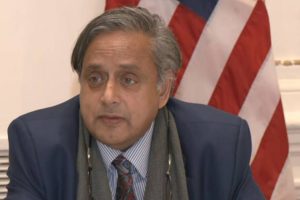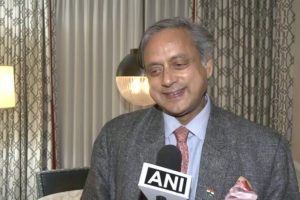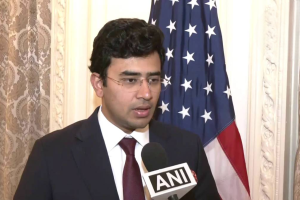Congress MP Shashi Tharoor, leading an all-party parliamentary delegation to the United States, described Operation Sindoor as a “brilliantly chosen name” during an address at the National Press Club. The delegation is visiting major global capitals as part of India’s diplomatic offensive following the April 22 Pahalgam terror attack, which claimed 26 lives.
Explaining the symbolism, Tharoor said the vermilion mark (sindoor) traditionally worn by married Hindu women represents both life and sacred bonds — and its desecration by terrorists who deliberately left widows behind added emotional weight to the name of India’s counter-terror operation.
“That sindoor had been wiped off the foreheads of 26 Indian women. And so we wanted to avenge that act. The colour of sindoor is bright red — not far from the colour of blood — and in many ways, there is a Hindi expression ‘khoon ka badla khoon’; here it was ‘sindoor ka badla khoon’,” Tharoor remarked.
The remarks came amid a broader diplomatic mission to brief U.S. lawmakers and opinion leaders on India’s stance against cross-border terrorism and the success of Operation Sindoor, launched on May 7 in response to the Pahalgam attack. Indian forces targeted terror camps and Pakistani airbases, inflicting significant damage. According to Tharoor, the operation struck 11 Pakistani airfields from Hyderabad (South Pakistan) to Peshawar (Northwest), prompting Islamabad to seek a cessation of hostilities by May 10.
Responding to questions on military losses, Tharoor maintained that such operational details remain classified and are not publicly disclosed by either side. However, he pointed to satellite imagery and Pakistan’s own admissions as evidence of the scale and effectiveness of India’s retaliation.
The delegation includes representatives from across the political spectrum, such as BJP MPs Tejaswi Surya and Bhubaneswar Kalita, Shiv Sena MP Milind Deora, LJP’s Shambhavi Chaudhary, and JMM’s Sarfaraz Ahmed. They also held key meetings with members of the U.S. House India Caucus, including Ro Khanna, Rich McCormick, Andy Barr, and Marc Veasey.
In a separate session, the delegation briefed the U.S. House Foreign Affairs Committee (HFAC), which includes Chair Brian Mast, Ranking Member Gregory Meeks, and several other senior lawmakers. HFAC members unanimously condemned the Pahalgam terror attack and reiterated bipartisan support for India’s right to respond to terrorism with zero tolerance.
The Indian Embassy in the U.S. highlighted the engagement, noting that the delegation explained how Operation Sindoor had “defined a new normal” in India’s anti-terror posture and reflected the country’s evolving response to cross-border threats.
The U.S. visit follows the delegation’s earlier stop in Brazil and forms part of a coordinated global outreach to counter disinformation and showcase India’s diplomatic and military resolve.
On April 22, 26 people — including 25 Indian nationals and one Nepali citizen — were killed in a brutal terrorist attack in Jammu and Kashmir’s Baisaran valley near Pahalgam. In response, Operation Sindoor was launched to dismantle terror infrastructure in Pakistan and Pakistan-occupied Jammu and Kashmir. Over 100 militants from groups such as Jaish-e-Mohammed, Lashkar-e-Taiba, and Hizbul Mujahideen were reportedly neutralized.





